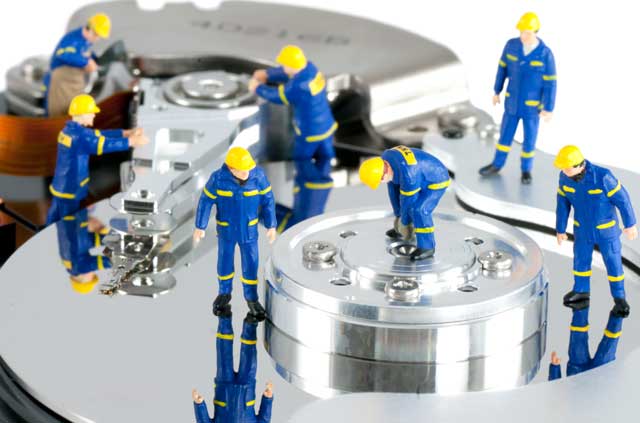
If you are like most other computer users, you’ll rarely throw away or delete data. And with disk space becoming cheaper and cheaper, you’ll rarely have to. But if you do ever need to get rid of an old hard drive, it’s important to take precautions first.
The cost of memory storage has decreased dramatically over recent years. According to data assembled by John C. McCallum, a hard drive with enough space to hold two Terabytes (TB) of data would have cost you 1,360 USD in 2004. Three years later, in 2007, that price was down to 530 USD. In 2010, it would have only cost 140 USD, and in 2013, 110 USD.
Today you can get almost double as much space for 110 USD, and two TB drives are now on the smaller end of the available spectrum of hard drives.
How to prepare for hard-drive failure
It's important to set up your computer properly, to ensure that the hard drive is encrypted. This is easy to set up on a Mac with the inbuilt FileVault. Windows users can use programs like Bitlocker to encrypt their hard drives and most Linux distributions, like Ubuntu, have this native encryption capability.
It is advisable to keep a physical second hard drive (not just a separate partition on your internal hard drive). A desktop computer can often easily fit another hard drive into its tower, and an external hard drive will do for smaller towers or laptops. If you only backup your most important data, the storage requirements will not be expensive at all.
Whatever backup solution you choose, remember to encrypt your backups. Encryption is usually applied by just a ticking a box and will ensure the data is protected from seizure, theft, or loss.
Hard drive failures can be difficult to foresee, and sometimes they are abrupt and instantly fatal. Most of the time, however, your hard disk failure will slowly creep up on you, with more and more errors occurring when booting your computer, more system crashes, and an increasing number of inaccessible files.
Hopefully, the typically slow nature of failure will allow you to move files to a new drive without significant data loss.
Replacing your hard drive
Given the speed at which hard drives are getting bigger and cheaper, you will likely want to replace your machine’s hard drive before you replace your computer. Hard drives have fast moving parts and are one of the least durable parts of a computer, with an average lifespan of only three to five years.
Despite such a short life, there is a lively market for used hard drives. Some people buy them for cheap data storage, while others, like criminal groups, systematically buy up old hard drives to look for private data and company secrets.
Passwords and cookies stored on hard drives can be especially valuable, but your personal information can also be in high demand, for many reasons, including identity theft.
What to do with your old hard drive
Once you’ve moved your data to a new device, you’ll have to get rid of your old hard drive. Ideally your hard old drive still works, and you can format it with the built-in tools of your operating system, such as Disk Wipe on Windows, Disk Utility on Mac OS X, or Gnome Disk Utility on Ubuntu.
Simply format the entire drive, overwrite it with zeros (select this option in your disk utility), and optionally repeat the process once or twice, just to be sure.
Recovering your data now will be incredibly difficult and prohibitively expensive. Though a well-funded adversary, such as the spy agency of a large government, might still be able to recover some of your data.
High profile targets of surveillance will likely need to undergo some extra steps to render their hard drives unreadable, such as disassembling the drive and sanding the surface of the disks, or shredding the parts. However, these processes are not advisable to inexperienced users and can pose serious health hazards.
Make sure old systems are protected
It’s never too late to ensure old hard drives do not contain unencrypted personal Data. Encryption was not as prevalent as it is now, even as recently as three years ago, so likely your old drives are not properly secured.
If you do not have the ability to wipe your hard disk, for example because your computer is no longer able to detect it, others might also not be able to access your data. However, it is sometimes difficult to assess how easily a hard drive can be fixed, and that uncertainty could bear risk.
The easiest way to render your hard drive unreadable, in instances where you can’t access it, is to drill a hole on in, or smash it up with a hammer.
Destroying a hard drive in such a fashion requires great caution and experience in drilling. You will likely need to apply a lot of force which could cause damage to you or your surroundings.
Dispose of old hard drives safely and responsibly
Remember that hard drives cannot simply be disposed of in the household trash, as they contain toxic materials and are partly recyclable. Your nearby electronics market or recycling station should be able to help you.
Featured image: KirillM / Deposit Photos
Take the first step to protect yourself online. Try ExpressVPN risk-free.
Get ExpressVPN




